AI is transforming lead generation by automating repetitive tasks, analyzing vast datasets, and providing real-time insights. Businesses that leverage AI-powered lead generation strategies have seen significant improvements in sales productivity. Companies that leverage AI lead generation strategies have experienced a 15-20% increase in efficiency. By streamlining lead qualification and enhancing customer interactions, AI enables sales teams to focus on high-value sales prospects.
In this blog, we’ll explore how AI can optimize lead generation, highlight the top tools available, and share real-world case studies. Keep reading to discover how AI can help you scale your sales pipeline effortlessly.
Understanding AI in Lead Generation
AI in lead generation uses machine learning, predictive analytics, and automation to identify, qualify, and nurture leads.
For example, AI-powered voice agent engage with website visitors, analyse their behaviour, and qualify leads instantly. Tools like CallHippo AI Sales Agent and Conversica use conversational AI to interact with prospects 24/7, increasing conversion rates.
By automating these processes, businesses can save time, improve lead quality, and streamline their B2B sales pipeline for greater efficiency and growth.
4 Key AI Lead Generation Benefits to Give You Competitive Edge
AI has transformed lead generation by making it more efficient, data-driven, and scalable. By automating lead identification, qualification, and nurturing, businesses can focus on high-value prospects while reducing manual effort.
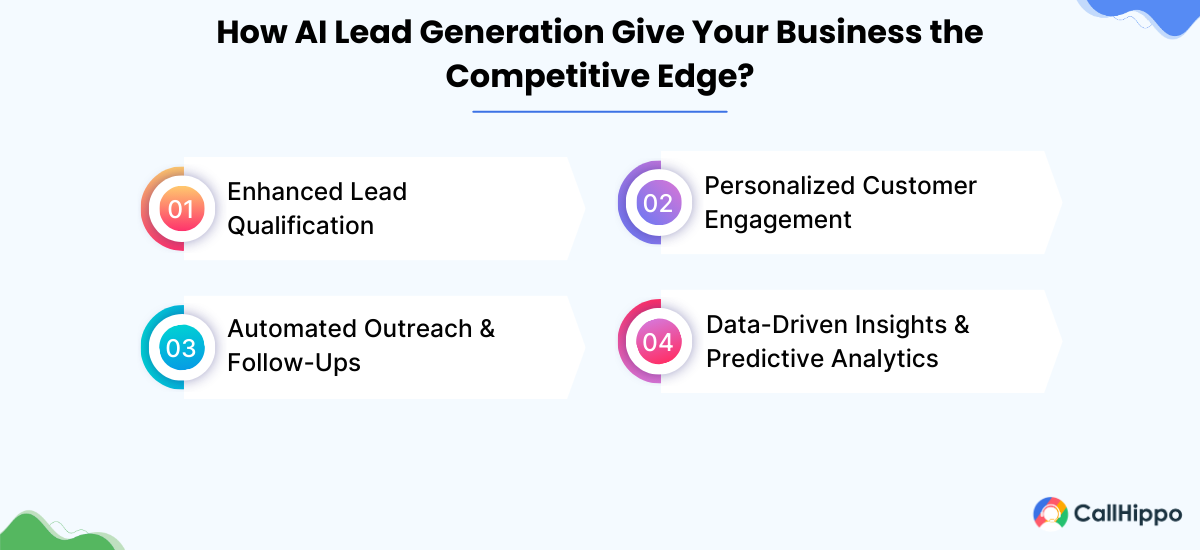
Below are some key benefits of using AI for lead generation:
1. Enhanced Lead Qualification
AI in lead generation helps businesses identify high-intent prospects by analyzing customer behavior, demographics, and engagement patterns. AI-powered tools assess leads in real time, ranking them based on their likelihood to convert.
This allows sales and marketing teams to prioritize high-quality leads, improving efficiency and maximizing ROI.
By automating this process, AI-based lead generation reduces guesswork and enhances overall lead generation efforts.
2. Personalized Customer Engagement
With AI sales lead generation, businesses can deliver highly personalized interactions using chatbots and virtual assistants.
These AI-driven tools analyze customer preferences, past interactions, and real-time behavior to craft tailored responses.
This level of personalization boosts engagement, strengthens customer relationships, and significantly increases conversion rates. By leveraging lead generation using AI, companies can create meaningful connections with prospects, enhancing their overall customer experience.
3. Automated Outreach & Follow-Ups
AI-based lead generation automates outreach by scheduling personalized emails, follow-ups, and reminders without manual intervention. AI-driven tools track prospect engagement and adjust messaging accordingly, ensuring timely communication.
This proactive approach keeps potential leads engaged throughout the sales funnel while allowing sales and marketing teams to focus on strategic tasks. By integrating AI in lead generation, businesses can streamline their lead generation efforts and improve lead nurturing.
4. Data-Driven Insights & Predictive Analytics
AI-driven analytics provide valuable insights into customer behavior by examining past interactions, purchasing trends, and engagement levels.
With AI sales lead generation, businesses can predict future buying patterns and optimize their sales strategies. These insights enable sales and marketing teams to make data-backed decisions, refine their campaigns, and drive higher conversions.
By incorporating lead generation using AI, companies gain a competitive edge and improve overall revenue growth.
Step-by-Step Implementation Guide For AI Lead Generation Process
AI-powered lead generation streamlines the process of identifying, engaging, and converting potential customers. By leveraging automation, predictive analytics, and personalized outreach, businesses can enhance efficiency, improve targeting, and drive higher conversions.
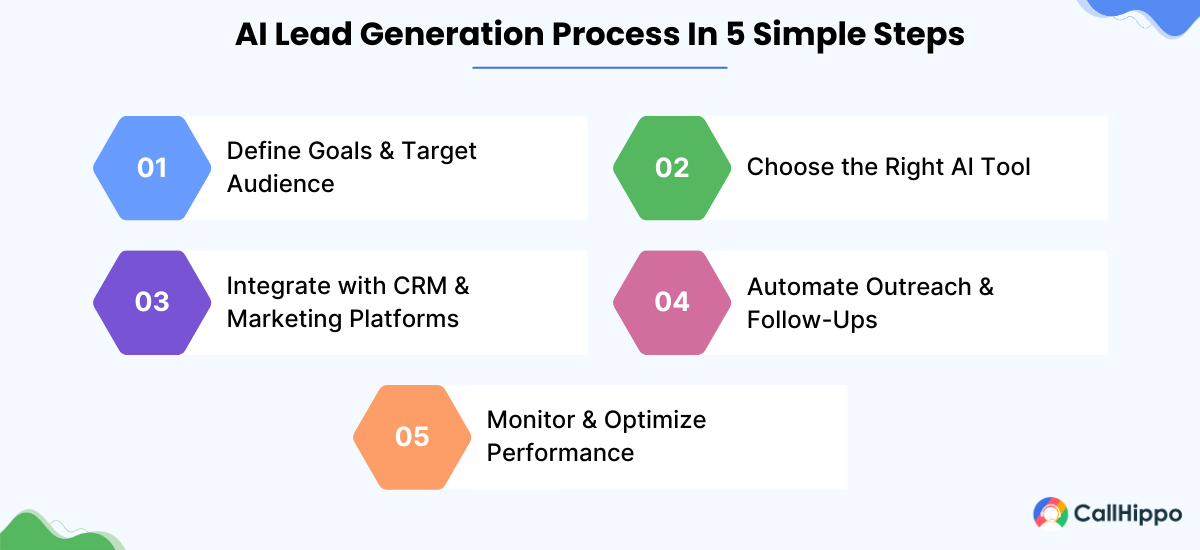
1. Define Goals & Target Audience
Define your business goals and pinpoint your ideal customer personas. Analyze their challenges, preferences, and behaviors to craft AI-powered lead generation strategies that resonate and drive engagement.
2. Choose the Right AI Tool
Select AI-powered software that aligns with your industry and sales process. Look for tools with predictive analytics, chatbots, automated outreach, and data-driven insights to enhance lead identification and nurturing.
3. Integrate with CRM & Marketing Platforms
Ensure AI tools sync with your CRM, email marketing, and social media platforms. This integration helps maintain consistent communication, improves lead tracking, and enables personalized engagement across multiple channels.
4. Automate Outreach & Follow-Ups
Utilize AI-driven email sequences, chatbots, and automated responses to nurture leads efficiently. AI can personalize messages, schedule follow-ups, and engage prospects at the right time to increase conversions.
5. Monitor & Optimize Performance
Regularly evaluate AI-driven data to optimize lead generation strategies. Monitor key metrics like response rates, conversions, and engagement to enhance performance and boost ROI.
Industry Use Cases: How AI Is Transforming Lead Generation?
AI is transforming lead generation across industries by automating customer interactions, analyzing data for better targeting, and enhancing engagement. From e-commerce to real estate, AI-powered tools streamline lead nurturing, improve conversions, and optimize sales strategies.
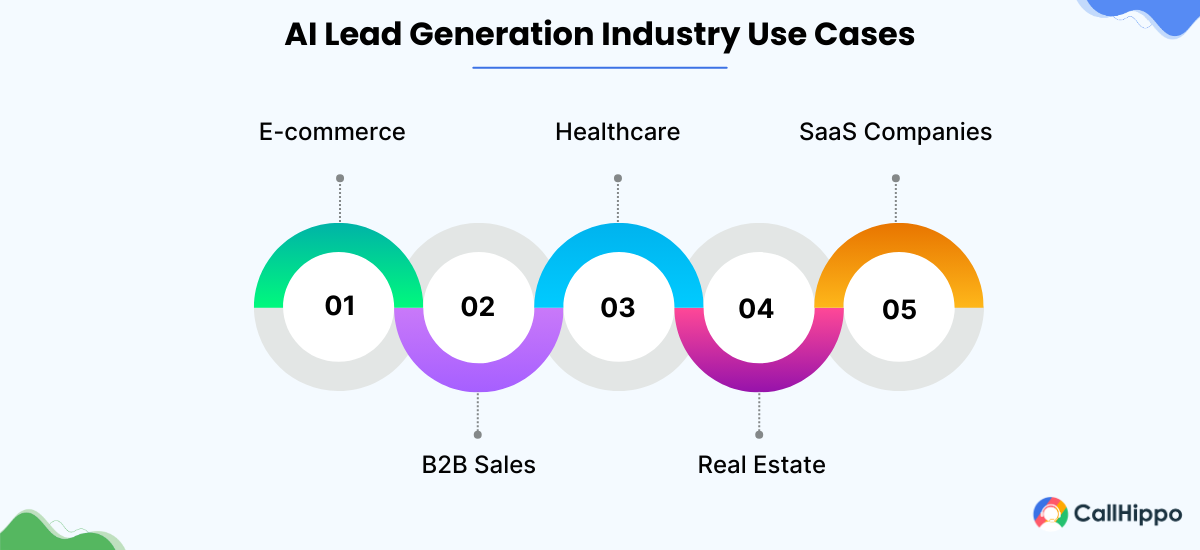
1. E-commerce
AI significantly boosts e-commerce by improving customer engagement and increasing conversions. AI chatbots provide real-time support, answering queries and assisting with purchases, while recommendation engines analyze user behavior and preferences to suggest relevant products, enhancing sales potential.
Additionally, AI automates data collection, segments audiences based on behavior, and personalizes marketing campaigns. This improves customer experience and boosts retention rates. AI can also predict shopping trends, helping businesses optimize inventory and pricing strategies.
2. B2B Sales
AI revolutionizes B2B sales by helping businesses identify and prioritize high-value prospects. Predictive analytics examines historical data, customer interactions, and behavioral patterns to determine which leads are most likely to convert. This enables sales teams to focus their efforts on prospects with the highest potential, improving efficiency and revenue generation.
AI-powered CRM tools further streamline the lead nurturing process by automating follow-ups, personalizing outreach, and tracking engagement metrics. Automated email campaigns, AI chatbots, and intent-based lead scoring ensure timely and relevant communication with prospects.
Example: HubSpot’s AI-driven lead scoring system helps sales teams identify the most promising leads, ensuring better resource allocation and improved conversion rates.
3. Healthcare
AI-powered tools are revolutionizing healthcare by enhancing patient engagement and streamlining administrative processes. Chatbots and intelligent forms assist in collecting patient inquiries, scheduling appointments, and providing preliminary medical advice, thereby improving accessibility and efficiency.
These AI systems can segment patients based on their specific needs, delivering targeted health-related content to nurture them into becoming paying clients.
Example: Mayo Clinic utilizes AI-driven chatbots to help patients find relevant healthcare services and schedule appointments based on their symptoms.
These chatbots provide 24/7 support, answering queries and guiding patients through the scheduling process, which enhances patient satisfaction and optimizes clinic operations.
- Mayo Clinic's AI-powered virtual care platform, Primary Care On Demand, offers 24/7/365 access to acute care through an AI-driven mobile application and video visits with Mayo Clinic clinicians. Source
4. Real Estate
Finding the perfect property can be overwhelming, but AI simplifies the process by analyzing buyer behavior and providing tailored recommendations. Real estate platforms use machine learning to assess search history, budget, and preferences, ensuring buyers see the most relevant listings.
Chatbots handle inquiries 24/7, answering questions about properties, financing options, and scheduling viewings. Predictive analytics also helps agents understand market trends, forecast property values, and identify high-demand locations, making it easier to target potential buyers.
Example: Zillow’s Zestimate tool predicts home values using AI-driven insights, helping buyers and sellers make informed real estate decisions while matching prospects with suitable properties based on their search patterns.
5. SaaS Companies
SaaS companies rely on AI to streamline the lead generation process by automating trial sign-ups, demo scheduling, and customer engagement. AI-powered chatbots interact with website visitors, answer product-related queries, and qualify leads in real time. This ensures that only high-intent prospects reach the sales team, improving conversion rates.
Additionally, AI-driven email sequences nurture leads by delivering personalized content, onboarding guidance, and timely follow-ups. By analyzing user interactions and behavioral data, AI helps refine marketing strategies and optimize customer acquisition.
Example: Drift’s AI chatbot qualifies leads, books sales meetings, and automates follow-ups, enhancing sales efficiency and customer engagement.
Case Studies: AI Lead Generation Success Stories
Discover how businesses have successfully leveraged AI to enhance their lead generation strategies. These real-world case studies showcase the impact of AI-driven tools in boosting conversions, automating engagement, and optimizing sales processes.
Case Study 1: Drift’s AI Chatbot Increased Conversions by 30%
Drift, a leading conversational marketing platform, sought to enhance its lead generation by implementing AI-driven chatbots. By integrating their chatbot solution, Drift aimed to engage website visitors in real time, providing instant responses to queries and guiding prospects through the sales funnel.
This proactive engagement strategy led to a significant increase in user interaction. Notably, Drift experienced a 265% boost in home page conversions, attributed to the chatbot’s ability to deliver personalized experiences and streamline the customer journey.
The AI chatbot effectively reduced response times and improved user satisfaction, resulting in higher conversion rates and a more efficient lead generation process.
Case Study 2: ZoomInfo Boosted B2B Sales by 40%
ZoomInfo, a prominent B2B intelligence platform, introduced its AI-powered solution, ZoomInfo Copilot, to enhance sales efficiency and lead generation. By leveraging AI to analyze vast datasets, ZoomInfo Copilot provided sales teams with actionable insights, identifying high-potential prospects and optimal engagement strategies.
This data-driven approach enabled personalized outreach and timely follow-ups, aligning closely with customer needs. As a result, users of ZoomInfo Copilot reported capturing nearly 25% more sales pipeline, alongside a 60% boost in productivity and a 62% increase in email response rates.
The integration of AI into their lead generation strategy not only streamlined operations but also significantly enhanced the effectiveness of their sales efforts.
Find the Best AI Tool for Lead Generation – Fast & Easy
Selecting the best AI lead generation solution requires evaluating your business needs, target audience, and existing sales processes. A well-chosen AI tool enhances efficiency, improves lead quality, and streamlines your marketing and sales efforts.
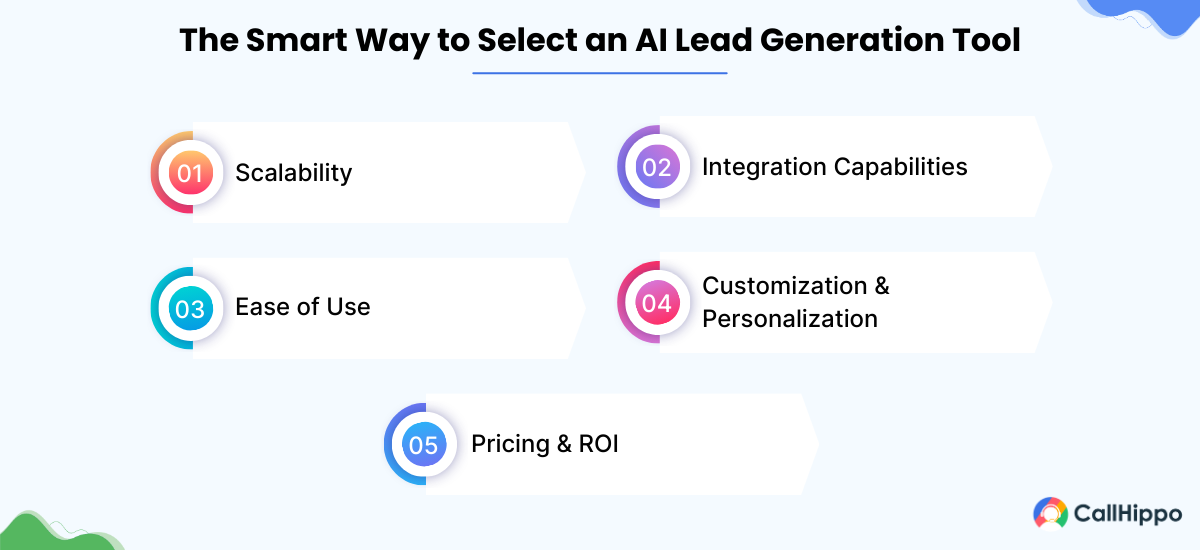
Here is how you can choose the right AI lead-generation solution for your business.
1. Scalability
When choosing an AI lead generation tool, scalability is crucial to ensure it can adapt as your business expands. A scalable solution should handle increased data volumes, integrate new features, and support growing customer interactions without performance issues.
Whether you’re a startup or an enterprise, the AI tool should efficiently manage higher lead traffic and automation needs over time. Investing in a scalable AI system prevents the hassle of switching platforms later and ensures long-term business growth.
2. Integration Capabilities
A strong AI lead generation tool must integrate seamlessly with your existing CRM, email marketing platforms, and other sales tools. Proper integration ensures smooth data flow, eliminating manual data entry and improving lead tracking accuracy.
AI-driven automation works best when it connects with multiple platforms, enhancing customer insights and campaign efficiency. For instance, an AI tool integrated with HubSpot or Salesforce can streamline communication, lead scoring, and nurturing processes, ultimately improving conversions.
3. Ease of Use
User adoption plays a significant role in the success of AI-powered lead generation. A tool with an intuitive, user-friendly interface allows sales and marketing teams to maximize its potential with minimal training. Features like drag-and-drop automation, clear dashboards, and guided workflows make AI tools more accessible.
If employees struggle with complex configurations, productivity can suffer. Opting for a solution with an easy setup and seamless navigation ensures faster implementation and improved operational efficiency.
4. Customization & Personalization
AI lead generation solutions should offer customization options to align with your business’s unique needs. Tailoring AI workflows, lead scoring criteria, and chatbot responses improves engagement and relevance. Personalization enhances customer interactions by delivering targeted content, personalized recommendations, and dynamic follow-ups.
For instance, AI-driven email campaigns that adapt based on customer behavior significantly boost response rates. The ability to fine-tune AI processes ensures higher-quality leads and more effective marketing efforts.
5. Pricing & ROI
While cost is a key consideration, evaluating the return on investment (ROI) is equally important when selecting an AI lead generation tool. Compare pricing plans against the features provided and assess how efficiently the tool can generate and convert leads.
AI should enhance sales productivity, reduce manual effort, and increase revenue to justify its cost. A well-chosen AI solution will deliver measurable improvements in lead quality, sales conversions, and customer engagement, making it a valuable long-term investment.
AI Lead Generation Software & Tools
AI-powered lead generation tools help businesses automate prospecting, qualification, and engagement, making the sales process more efficient.
Below is a curated list of the top AI lead generation software to enhance your lead generation efforts.
| Company | Rating | Plan | Top Features | Learn More |
|---|---|---|---|---|
 | Basic: $0/user/month Starter: $18 Per User/Month Professional: $30 Per User/Month Ultimate: $42 Per User/Month |
| Learn More | |
 | Contact sales team for pricing |
| Learn More | |
 | On Request |
| Learn More | |
 | Conatact sales team for pricing. |
| Learn More | |
 | Free: $0, no time limit on the free plan Paid: $99 per month |
| Learn More |
Our selection process for these AI lead generation software is rooted in a blend of expert assessments and in-depth user reviews from trustworthy platforms like Capterra, G2, and SoftwareSuggest. We prioritized features essential to enterprise users, such as security, integration capability, customer satisfaction, ease of use, and quality of support. Every tool on this list has undergone a thorough evaluation based on these criteria to provide an informed and unbiased perspective.
1. CallHippo AI Sales Agent
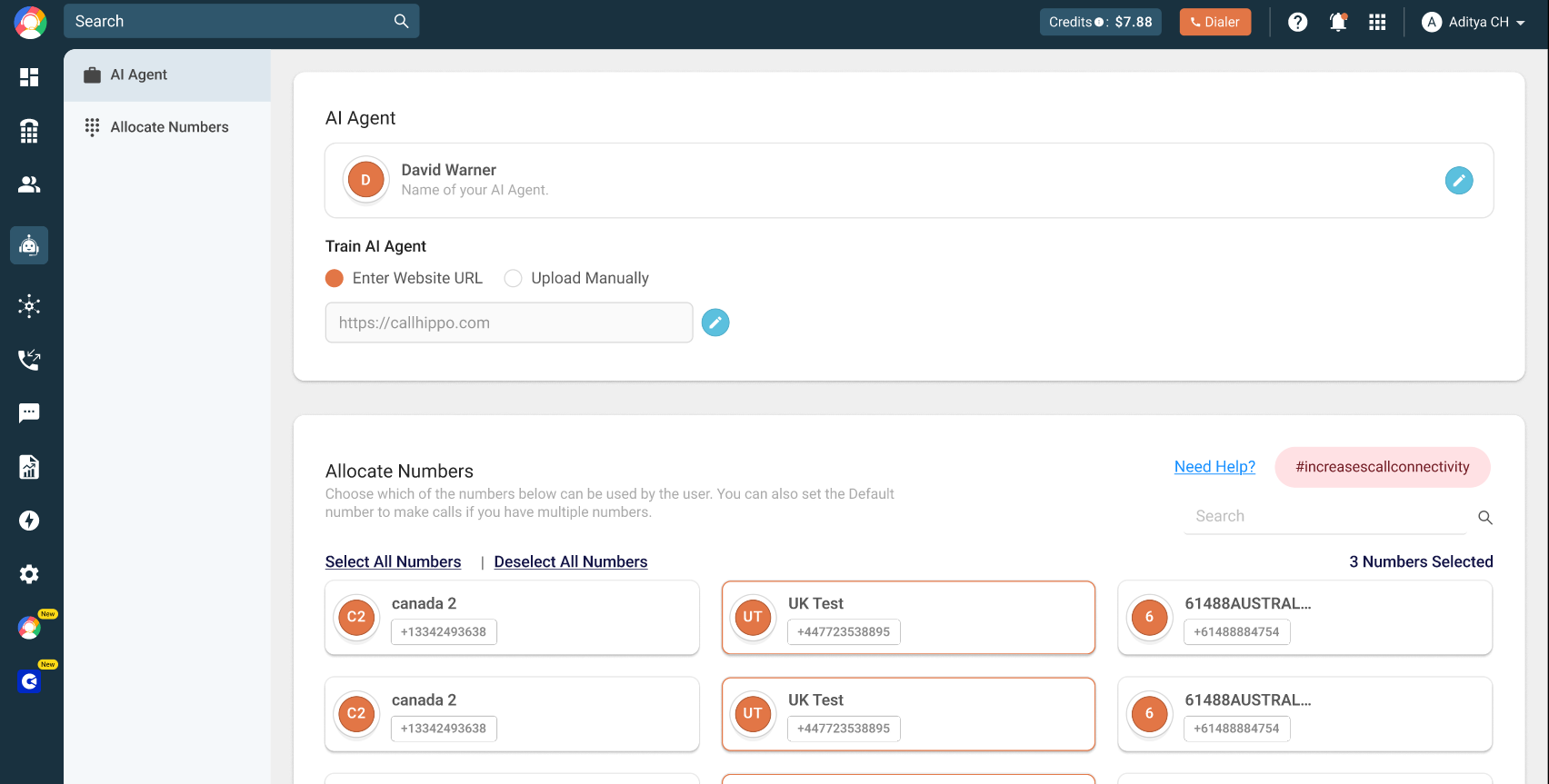
AI Sales Agent automate prospect engagement by using conversational AI to qualify leads and nurture relationships. These tools enhance efficiency by engaging potential customers with human-like interactions, ensuring timely follow-ups, and improving conversions. Businesses leveraging AI lead generation software can streamline lead qualification and scale their B2B lead generation efforts.
Key Features
- 24×7 lead qualification
- Automated follow-ups and reminders
- Real-time data analysis
- Integration with CRM and marketing tools
Pros
- Enhance engagement with AI-powered conversations that personalize interactions.
- Save time through automated lead nurturing, streamlining follow-ups.
- Scale customer interactions effortlessly with AI-driven automation.
Cons
- It may require training for complex queries.
- Limited customization in some platforms.
Pricing
Contact the sales team for pricing.
With AI Sales Agent
- Automated Lead Qualification
- 24/7 AI-Powered Engagement
- Smart Follow-Ups
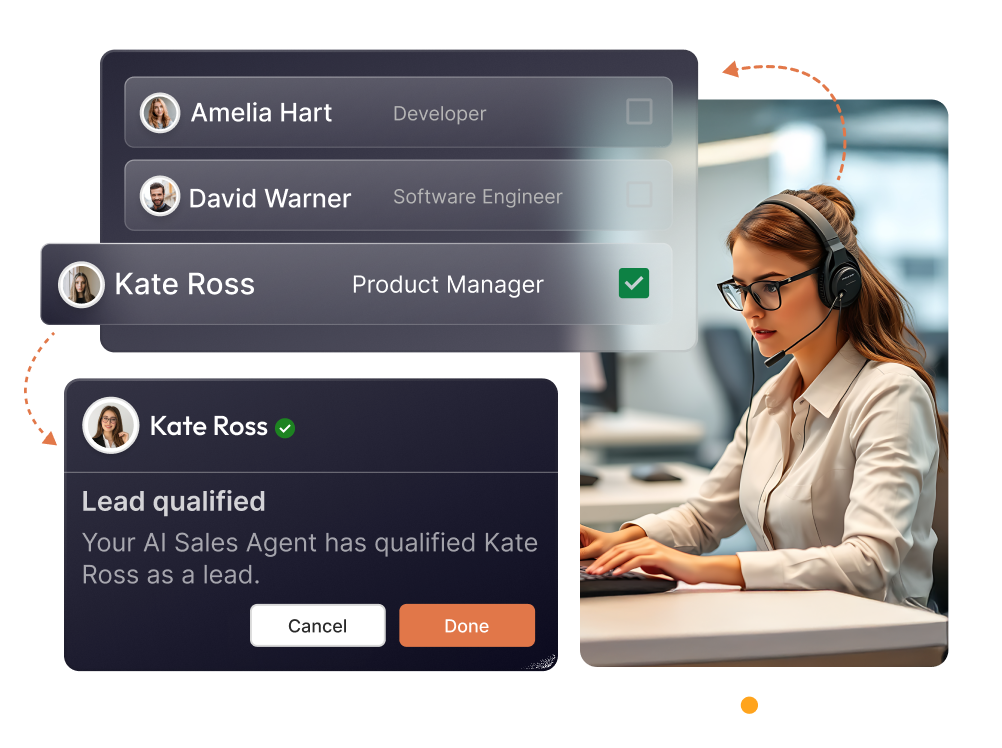
2. LinkedIn Sales Navigator
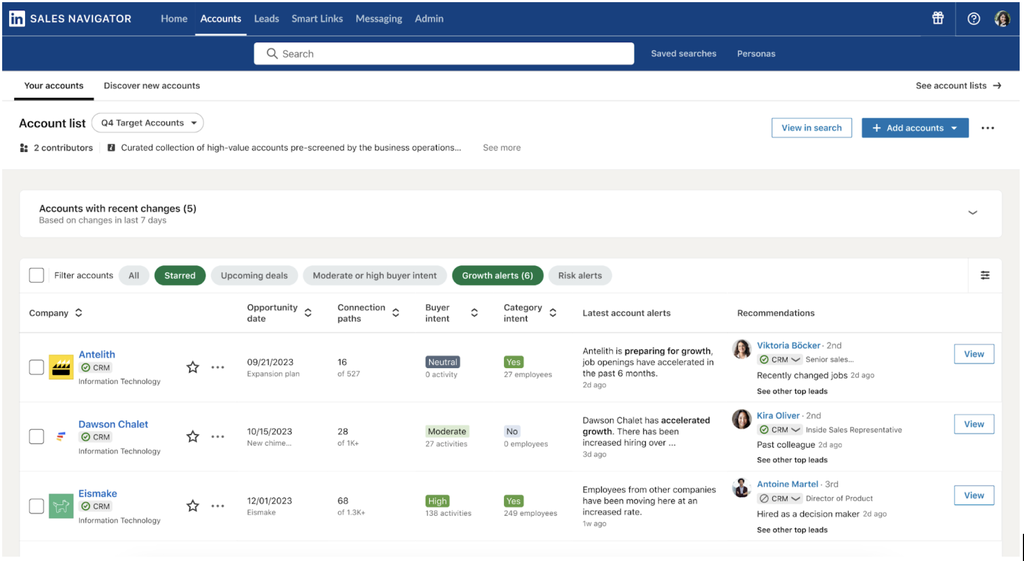
LinkedIn Sales Navigator is a top sales intelligence tool that helps businesses connect with key decision-makers. With advanced search filters, lead recommendations, and real-time insights, it’s a must-have for AI-driven lead generation and networking.
Key Features
- Lead/contact creation
- Customer ROI reporting
- Lead IQ
- Smart links
Pros
- Gain access to verified professional contact data for accurate outreach.
- Leverage AI-driven lead recommendations to enhance targeting.
- Integrate seamlessly with sales tools for a smooth workflow.
Cons
- The subscription costs may be high for small businesses.
- The automation features may be limited compared to other AI tools.
Pricing
Contact the sales team for pricing.
3. ZoomInfo
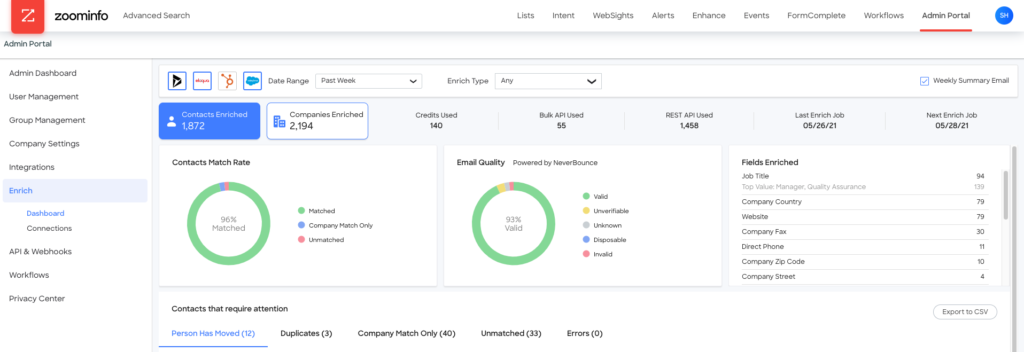
ZoomInfo is a B2B lead generation platform offering an extensive database of company and contact data. It enables sales and marketing teams to find, qualify, and connect with the right prospects using AI-powered insights.
Key Features
- Direct dial
- Advanced candidate search
- Automated lead scoring and segmentation
- Mobile phone number
Pros
- AI-generated leads are highly accurate and backed by verified data.
- Powerful search filters enable precise targeting of potential customers.
- The tool integrates seamlessly with CRMs and marketing platforms.
Cons
- The tool can be expensive for small businesses.
- It requires continuous data updates to maintain accuracy.
Pricing
Contact sales team for pricing.
4. Clearbit
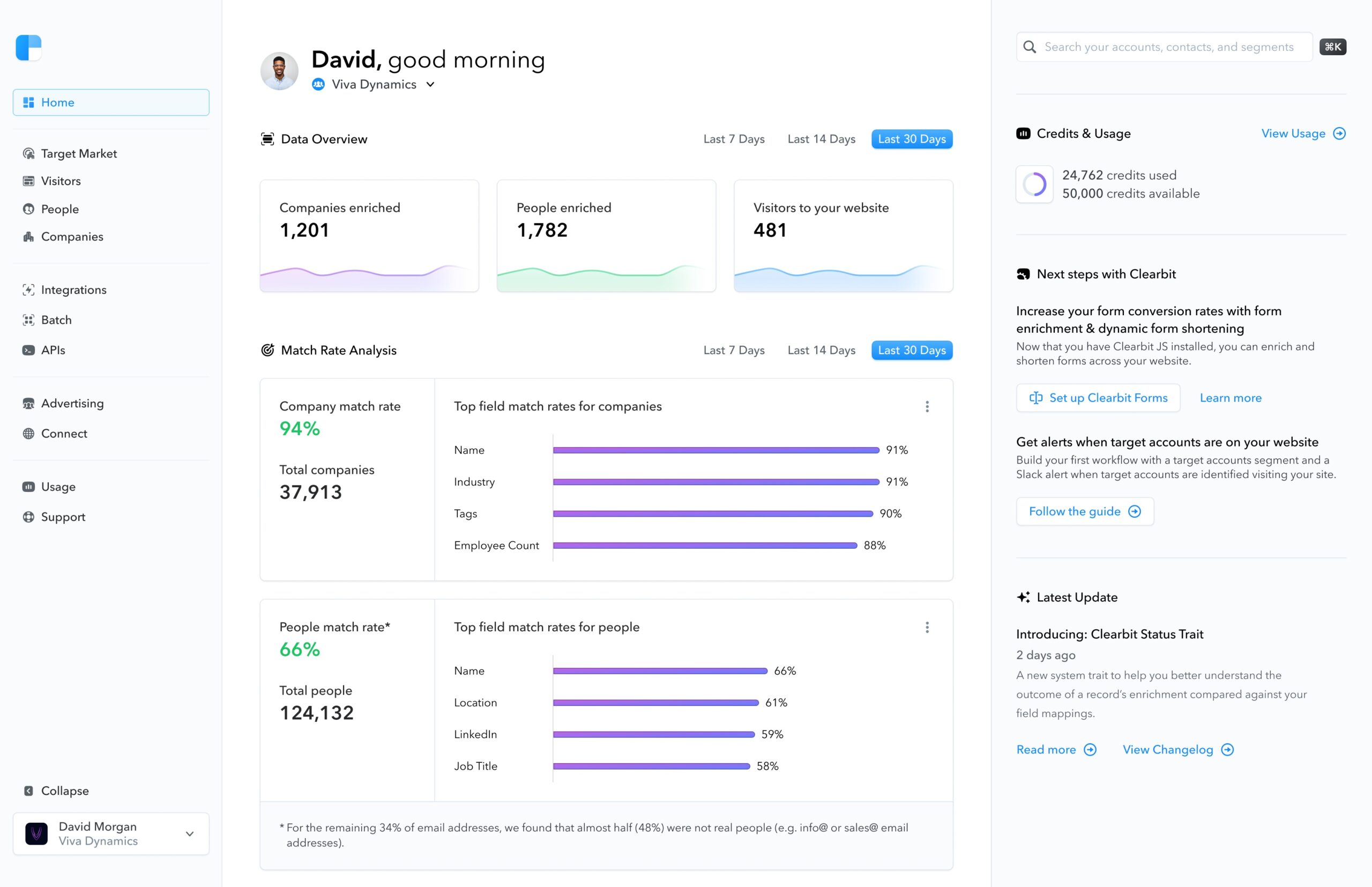
Clearbit enhances B2B lead generation by delivering real-time contact data and firmographic insights. It seamlessly integrates with sales and marketing platforms, enabling businesses to personalize outreach, improve targeting, and engage high-value leads more effectively using AI-powered data enrichment.
Key Features
- Real-time lead enrichment
- AI-powered firmographic
- Automated data refresh
- Seamless integration with CRMs
Pros
- It improves lead qualification by providing enriched data.
- It automates lead generation processes using AI technology.
- It enhances personalization to drive better conversions.
Cons
- It requires existing lead lists to deliver the best results.
- It can be expensive for startups with limited budgets.
Pricing
Contact the sales team for pricing.
5. Leadfeeder
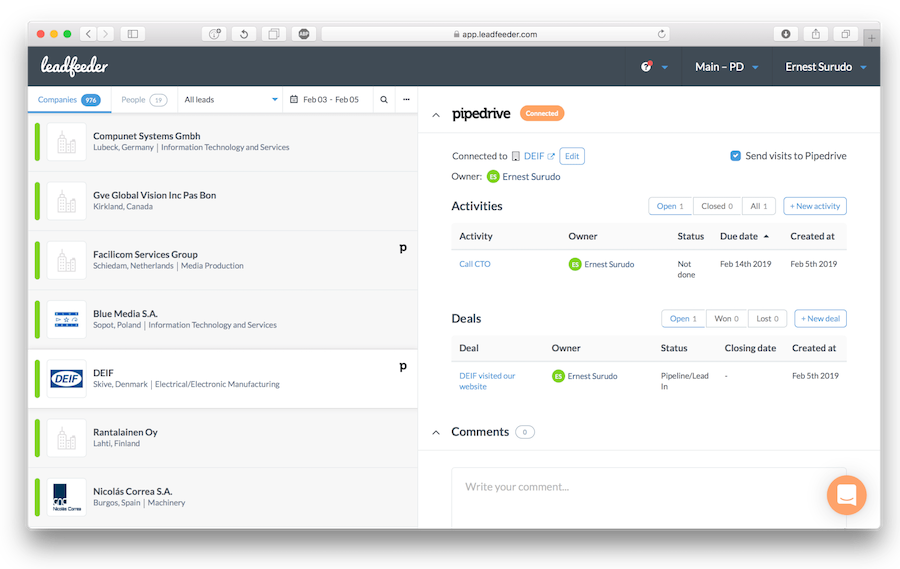
Leadfeeder enhances AI lead generation by identifying and tracking website visitors, and converting them into AI-generated leads. It provides detailed insights into visitor behavior, helping sales and marketing teams engage prospects more effectively and optimize their lead generation efforts.
Key Features
- AI-powered visitor identification and tracking
- Automatic lead scoring based on behavior
- CRM and sales tool integrations
- Verified company details
Pros
- It identifies anonymous website visitors to enhance B2B lead generation.
- AI-driven insights help improve lead targeting and engagement.
- It integrates seamlessly with major CRMs for efficient workflow management.
Cons
- It may provide limited contact data for certain visitors.
- Significant web traffic is required to deliver the best results.
Pricing
Free: $0, no time limit on the free plan
Paid: $99 per month
6. Drift
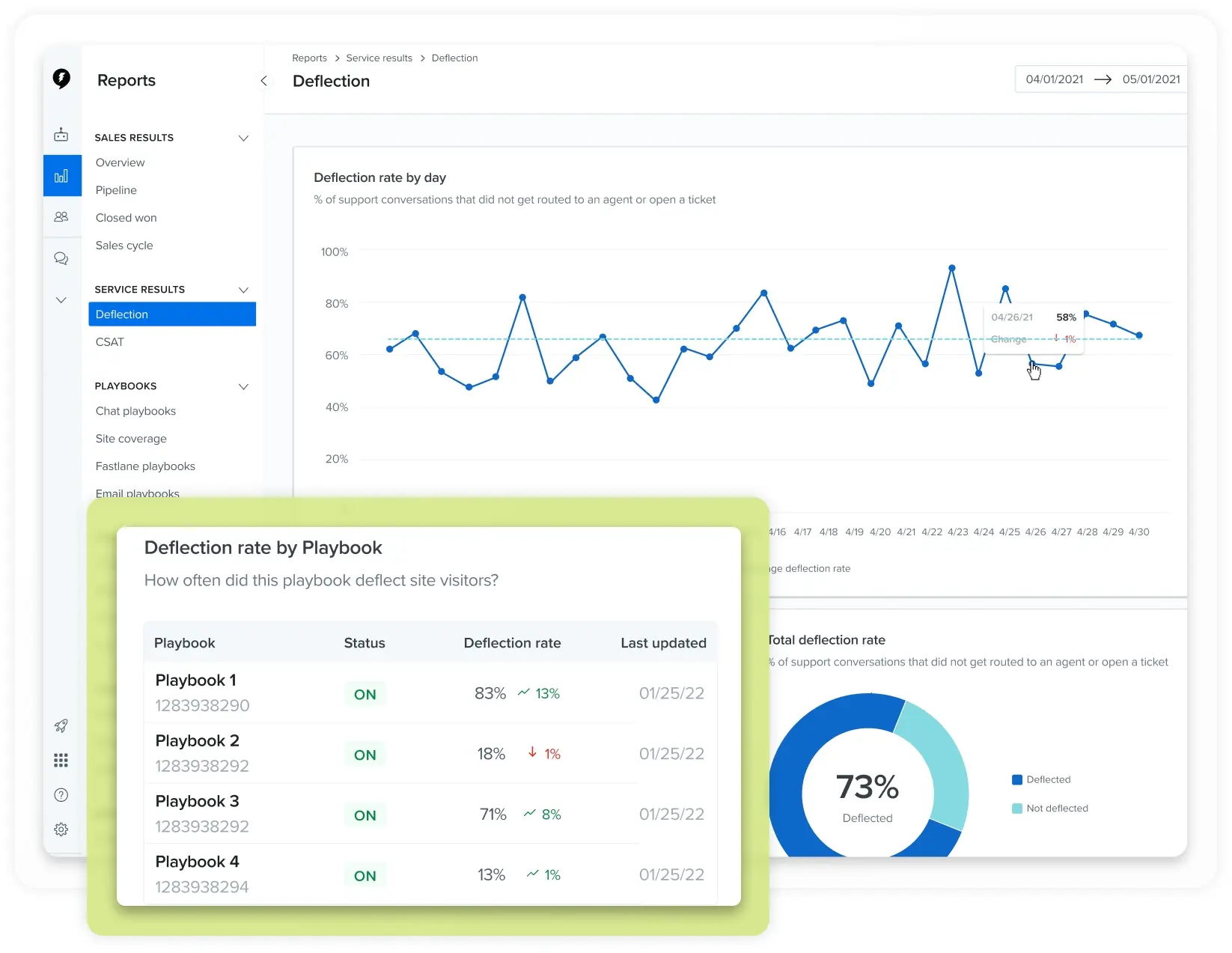
Drift is an AI lead generation software that uses AI chatbots to engage, qualify, and convert leads in real-time. By automating lead generation using AI it enhances customer interactions, delivers personalized experiences, and streamlines communication for sales and marketing teams.
Key Features
- AI chatbots for lead qualification
- Personalized messaging based on user behavior
- Integration with sales and marketing tools
- Real-time engagement and follow-ups
Pros
- It automates AI-generated leads using conversational AI.
- It increases engagement by delivering personalized responses.
- It speeds up lead qualification and streamlines nurturing processes.
Cons
- It requires optimization to handle complex sales cycles effectively.
- Lower-tier plans may offer limited analytics and insights.
Pricing
Custom pricing based on features and business size.
7. Conversica
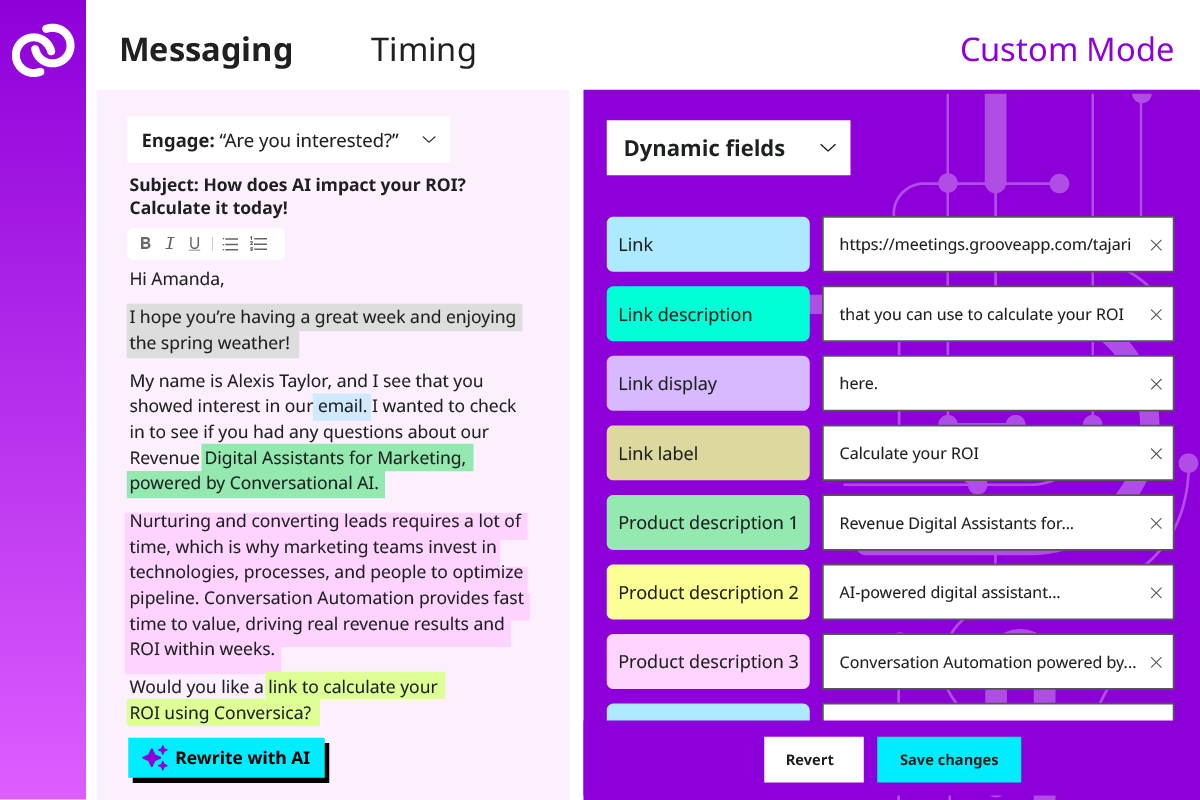
Conversica is an AI lead generation software that leverages AI-driven virtual assistants to automate follow-ups and engage prospects with human-like conversations. By streamlining B2B lead generation helps sales and marketing teams nurture leads efficiently, improving engagement and conversion rates.
Key Features
- AI-powered virtual sales assistants
- Automated follow-ups and email nurturing
- Multi-channel engagement (email, SMS, chat)
- CRM and sales tool integrations
Pros
- It improves engagement through natural AI-driven interactions.
- It saves time by automating follow-ups and responses.
- It scales lead conversion efforts efficiently with AI automation.
Cons
- It may require initial customization for industry-specific needs.
- High subscription cost for small businesses.
Pricing
Custom pricing based on usage and features.
8. Apollo.io
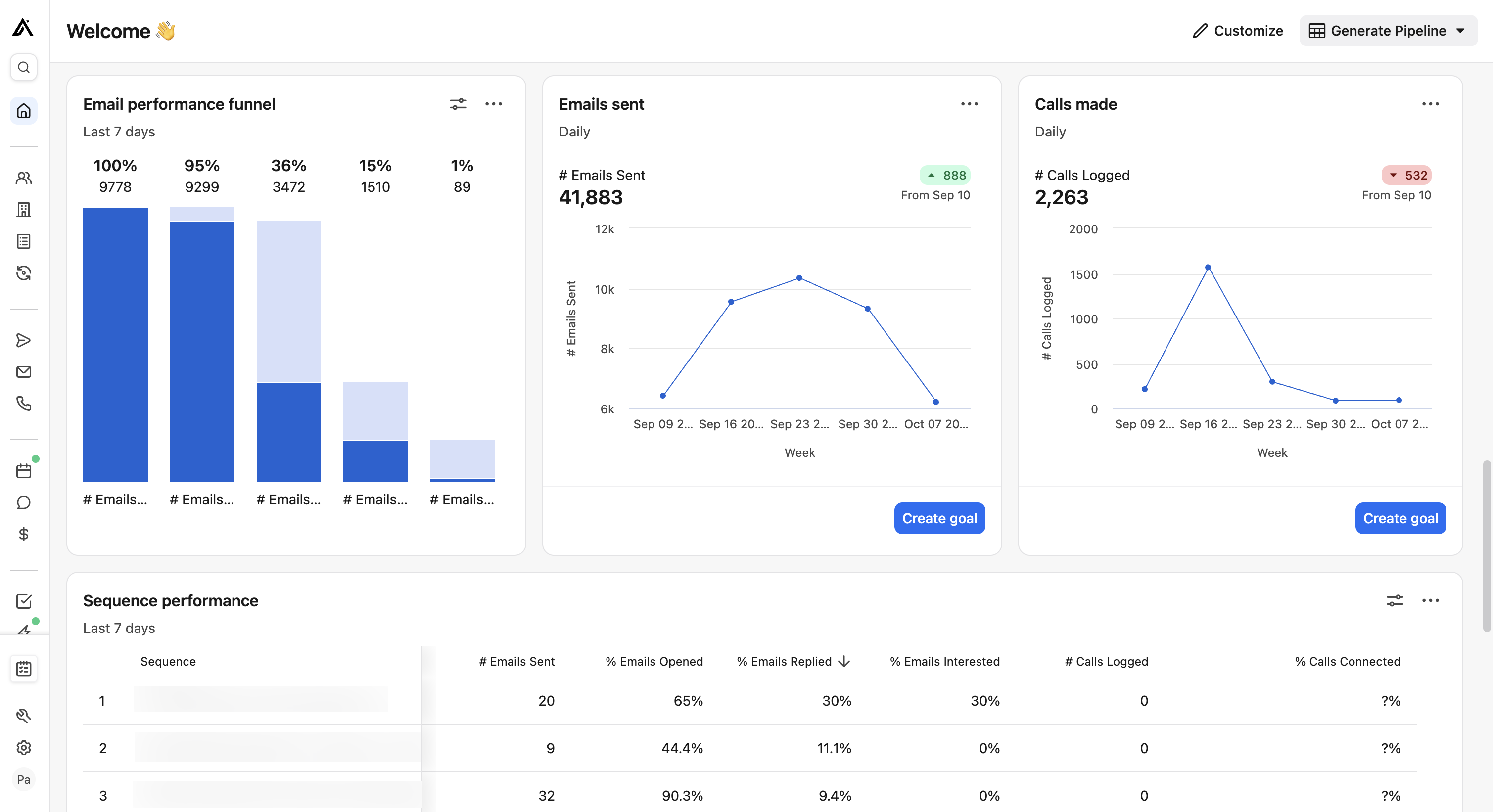
Apollo.io is a powerful AI lead generation software with a database of over 200 million contacts. It offers AI-powered sales engagement platform that automate prospecting and outreach, helping sales and marketing teams streamline their lead generation efforts and close deals faster.
Key Features
- AI-driven prospecting
- Automated outreach
- Advanced lead scoring
- CRM and sales tool integration
Pros
- It offers an extensive B2B lead generation database for better prospecting.
- AI-powered automation streamlines lead outreach and follow-ups.
- It provides affordable pricing, making it ideal for growing businesses.
Cons
- Data accuracy may vary across different industries.
- There may be a learning curve for new users to navigate the platform.
Pricing
Starts at $39/month per user.
9. Salesloft
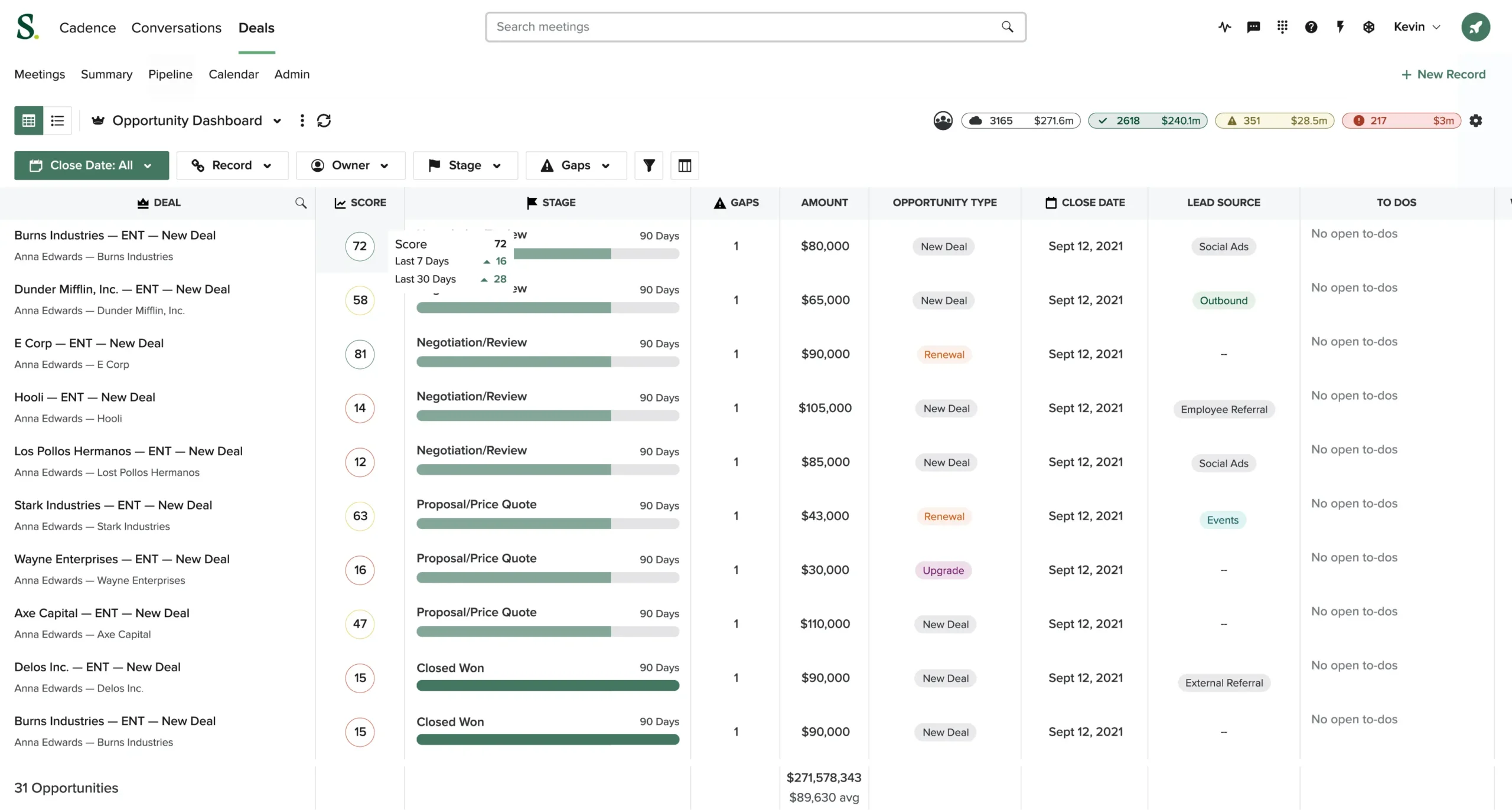
Salesloft is a sales intelligence software that enables businesses to engage leads through AI-powered email sequences, calls, and social interactions. Automating lead generation using AI streamlines sales workflows, enhances contact data management, and boosts productivity for sales and marketing teams.
Key Features
- AI-powered sales engagement
- Multi-channel prospecting
- Lead scoring
- Predictive analytics
- CRM and marketing platform integration
Pros
- It enhances lead generation efforts through AI automation.
- It provides data-driven insights to optimize sales strategies.
- It integrates seamlessly with major sales tools for efficiency.
Cons
- The pricing may be high for small businesses.
- It requires proper setup to achieve the best performance.
Pricing
Custom pricing based on team size and features.
10. Seamless.ai
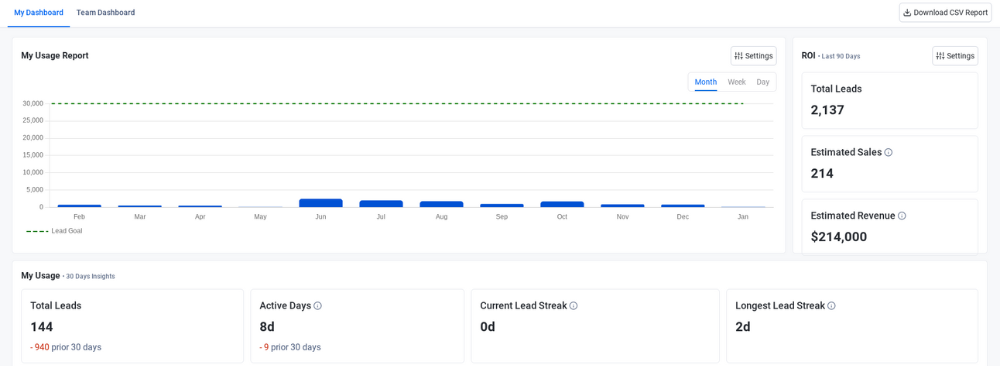
Seamless.ai is an AI-generated leads platform that helps sales and marketing teams find and verify contact data in real time. By leveraging AI in lead generation, it ensures accurate, up-to-date information, enabling businesses to connect with high-quality prospects and optimize their lead generation efforts.
Key Features
- AI-powered lead search
- Automated lead scoring
- Integration with CRMs
Pros
- It provides real-time verified contact data for accurate outreach.
- AI-driven lead discovery enhances targeting and precision.
- It is more affordable compared to competitors, making it cost-effective.
Cons
- Data accuracy may vary across different industries.
- Lower-tier plans may have limited automation features.
Pricing
Free plans are available, and premium plans vary by features.
Future of AI in Lead Generation
The future of AI in lead generation lies in enhanced predictive analytics, hyper-personalization, and autonomous AI-driven sales assistants. AI will refine its ability to analyze vast data sets, predict buyer intent, and deliver ultra-targeted marketing campaigns.
With advancements in natural language processing (NLP) and machine learning, AI chatbots and virtual agents will handle complex sales interactions independently.
As businesses embrace AI-driven solutions, lead generation will become more efficient, reducing manual effort while improving customer acquisition and conversion rates.
Conclusion
AI is transforming lead generation by automating workflows, enhancing data accuracy, and personalizing customer interactions. With AI-driven tools, businesses can optimize their sales funnel, nurture high-quality leads, and improve conversion rates.
As AI technology evolves, companies that adopt it strategically will gain a competitive edge, ensuring sustainable growth and efficient customer acquisition.

Subscribe to our newsletter & never miss our latest news and promotions.









